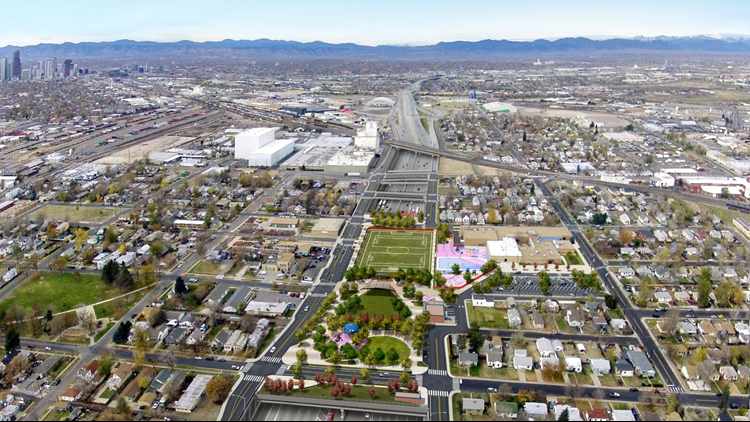KUSA — The project to expand Interstate 70 through the heart of Denver was granted a variance to allow nighttime construction noise levels to exceed limits prescribed by Denver’s noise regulations. Just after midnight, the Denver Board of Public Health and Environment on Friday approved the noise variance that the contractor sought, with one major change – how long it will last.
Kiewit Infrastructure Company had petitioned the board to allow a noise variance that would last 52 months, the expected duration of the Central 70 Project.
In a 3-2 vote, after hearing hours of testimony, almost all of it critical of the project, a shorthanded board approved a 12-month variance.
The board consists of nine members. Two recused themselves, citing potential conflicts of interest, and two were absent. Rules permit a quorum of five members, which allowed Friday’s vote to proceed.
Denver’s noise ordinance normally allows nighttime noise levels of 50 dBA in residential areas. (“dBA” is A-weighted decibels. This sound-weighting system corrects for humans’ lower sensitivity to some audio frequencies, especially low audio frequencies.)
The approved variance will allow nighttime construction noise levels to average 75 dBA, during the hours of 9 p.m. to 7 a.m., Monday through Friday, and 5 p.m. to 8 a.m. on weekends. Maximum nighttime noise levels cannot exceed 86 dBA during those periods. These are the noise levels Kiewit requested in its petition.
"Having a high level of neighborhood engagement, prompt resolution of complaints and staying on track with this project and also evaluating for any other issues that arise is what success looks like for us," said Denver Public Health Inspections Director Danica Lee. "When we get a complaint, we are visiting the nearest residential location, standing at the property line, conducting a measurement there, and the standards that are in our ordinance have to be met at that property line."
Construction of the Central 70 Project will impact several Denver neighborhoods that border the highway, including Globeville, Elyria-Swansea and Montbello. These are mostly low-income, largely Latino and African-American neighborhoods.
Drew Dutcher lives three houses away from the construction zone. He’s a leader of the Elyria and Swansea Neighborhood Association, which has been vocal in its opposition to the construction project.
“I’m happy the board only gave a one-year variance,” Dutcher told 9NEWS. “We need to see if these guys are going to behave.”
In its petition for variance presented to the city in August, Kiewit said it had hired a sound engineering company to conduct sound analysis testing at several locations along the construction zone. Kiewit said it determined, after compiling and modeling sound source levels, that its requested noise levels – average 75 dBA, maximum 86 dBA – “will not adversely affect public health.”
For its part, the Denver Department of Public Health and Environment said it “has attempted to balance public health with the need to conduct maintenance and construction work on the aging infrastructure” in a memorandum sent to its board in August.
The DDPHE memo recommended that the board accept a noise variance that extended through the completion of the project or up to December 15, 2022. In Friday’s early-hour vote, the board voted to trim the duration of the variance to just 12 months.
A spokesman for the board told 9NEWS that Kiewit could petition to extend the duration of the variance annually, by submitting a new variance petition or requesting a continuation of the approved variance. Kiewit would have to appear before the board before any extension is considered.
How loud will it be, really?
For a loudness comparison of common outdoor activities, the California Department of Transportation published a chart.
Quiet urban areas average about 40-50 dBA at nighttime. Quiet urban areas in daytime average about 50-60 dBA. These levels fall within the range that Denver city regulations allow in residential neighborhoods.
The approved I-70 noise variance allows an average of 75 dBA for nighttime construction. The CADOT chart shows that sound level is equivalent to a noisy urban area at daytime.
At the approved variance’s upper limit of 86 dBA, the CADOT chart says that sound level is nearly equivalent to a diesel truck at 50 feet traveling 50 miles per hour.



